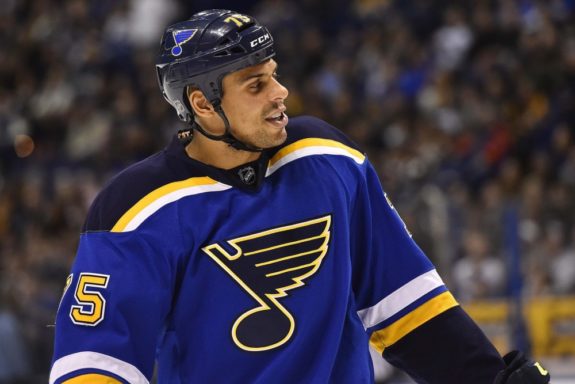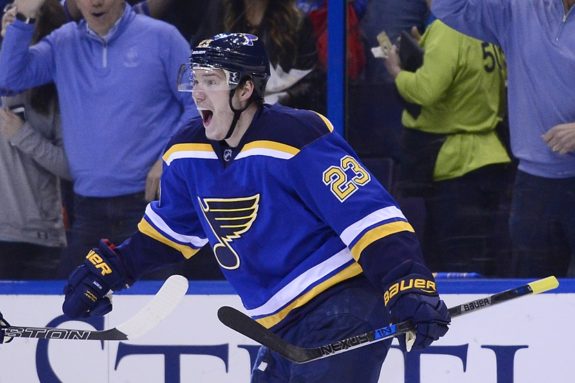The St. Louis Blues have made a plethora of moves this summer, adding four forwards to their group of nine through trade and free agency. In addition, the Blues have a number of prospects that may be prepared to make the jump to the NHL in the 2018-19 season. The implications of this turnover have been thoroughly and well dissected, and will continue to be until the puck drops on opening night and beyond.
One area of the team that may have been overlooked in the excitement is the Blues’ fourth line. A number of players formerly in the top-nine will now be reassigned into competing for fourth line roles. Let’s take a look at who these players might be, and whether these changes will benefit the team.
A Traditional Blues Strength
In recent memory, the Blues have always had a strong fourth line that served as defensive grinders and team energizers. Former head coach Ken Hitchcock, who served as the Blues’ coach from November 2011 until February 2017, was a big believer in the fourth line. Players like Ryan Reaves, Kyle Brodziak, and Scottie Upshall, among others, became fixtures on that line, valued for their experience and determination.

Now, all of those players are gone, and the Blues are faced with the choice of who will serve the team in those vital but overlooked roles going forward. The players in question will need to be physical, hard-working, and defensively responsible, if they are going to fill the skates of those that have gone before them.
Familiar Faces: Thorburn and Jaskin
The Blues have several players returning who spent some of last season on the fourth line who could continue to do so this year. There is a year remaining on the contract of Chris Thorburn, the player the Blues signed in the wake of trading Ryan Reaves to the Pittsburgh Penguins. He brings grit and a willingness to drop the gloves, a skill that the Blues have continued to value despite its decline in the league. Thorburn played 50 games and averaged only 7:02 in ice time last season, but still managed to collect almost two hits a game and participate in eight fights.

Dmitrij Jaskin is another strong candidate for fourth line minutes. Jaskin played in 76 games last year and recorded only 17 points. Even so, he was a solid defensive player, with a plus-minus of plus-6, a plus-19 in turnover differential, and he had a 53.9-percent Corsi-for percentage, meaning the team controlled the puck more often than not when he was on the ice. Jaskin could provide the steady defensive presence that a fourth line needs to succeed, and it might be a better role for him than trying to provide depth scoring on a higher line.
Ready to get back to work! See you soon St. Louis! ✈️
— Dmitrij Jaskin (@DmitrijJaskin) August 28, 2018
Two other players spent some significant time on the fourth line, particularly after Kyle Brodziak moved up the roster. Oskar Sundqvist, who was something of an afterthought in the trade that sent Ryan Reaves to Pittsburgh, played only 42 games in 2017-18, but averaged almost 10:30 TOI when he did play. He was underwhelming and would need to bounce back to earn a consistent role this season. Ivan Barbashev averaged over 12 minutes per game in his 53 appearances last season. He also had a down year from his rookie season, and it’s not certain whether he’ll be strong enough as a defensive center to lock down a spot on the fourth line.
New Arrivals: Soshnikov, Maroon & Prospects
Before moving on from Paul Stastny at the trade deadline, the Blues quietly traded for Nikita Soshnikov, a Russian winger who had lost out on playing time in an over-crowded Toronto system. “Nik Flair,” as he’s nicknamed for his incredible celebration after his first NHL goal, is exactly the kind of player who could steal hearts in a fourth-line role, especially in St. Louis.

Soshnikov is a blue-collar worker on the ice who is willing to sacrifice his body despite his relatively small size (he’s averaged two hits per game across his career). He is defensively capable—so much so that the notoriously picky Mike Babcock trusted him on the penalty kill—and he’s hard working. On top of everything else, he has a pretty strong shot (as evidenced in the goal linked above). He was beloved by many in Toronto, and if he can stay healthy (he’s struggled with concussions in his career) he will likely become a fan favorite in St. Louis.
Patrick Maroon is a potential player for the fourth line, too. His relatively meager contract makes this a possibility, as does his physical skill set. With that said, Maroon is more of a scoring threat than a traditional fourth-line player and brings a desperately needed net-front presence. Considering that, it seems unlikely he’ll spend much time on the fourth line.
A few players the Blues have developed or brought in through free agency have a small chance of making a fourth line impact. The Blues signed Jordan Nolan, formerly of the Buffalo Sabres, to a one-year, two-way deal. Most likely, Nolan will spend his season in the AHL, but if he impresses in training camp, he could earn a fourth line role. Nolan Stevens, who stood out in college captaining the Northeastern University squad, and Adam Musil, who struggled some last year with the Blues’ inconsistent AHL situation, but has projected to be a good bottom-six, two-way center, could slide into roles, but both will probably be playing alongside Nolan in San Antonio.
Finally, the Blues might consider utilizing top prospect Robert Thomas in a fourth-line role as he adjusts to the NHL game. He would certainly be capable in that role: he plays a very sensible two-way game. The only question for Thomas is whether a fourth-line assignment might be a waste of his burgeoning talent. If he were used in that capacity, it certainly wouldn’t be for long.

The Blues’ Future Backbone
The Blues have a surplus of options on the fourth line, but a dearth of certainty. Their longtime stalwarts in Kyle Brodziak and Scottie Upshall are now departed (though recently reunited in Edmonton), leaving a significant hole on a line that has been a traditional strength. Mike Yeo is now tasked with sifting through the remaining options to find the players who can form a fourth line that brings energy, defense, and a change-of-pace.
I believe the most likely options to fill those roles are Nikita Soshnikov, Ivan Barbashev, and Dmitrij Jaskin. Soshnikov and Jaskin, when healthy, are relative certainties. The center role remains somewhat up in the air, with Barbashev and Sundqvist as strong possibilities. Robert Thomas is unlikely to spend much time on the fourth line, if he spends any at all.

In Jaskin and Soshnikov, the Blues will find energy and defensive capability. Those two players alone could continue the tradition of a responsible fourth line in St. Louis, and even offer some scoring potential. While the fourth line for the Blues has been an afterthought all offseason, the pieces may be falling into place to make it a strength yet again.